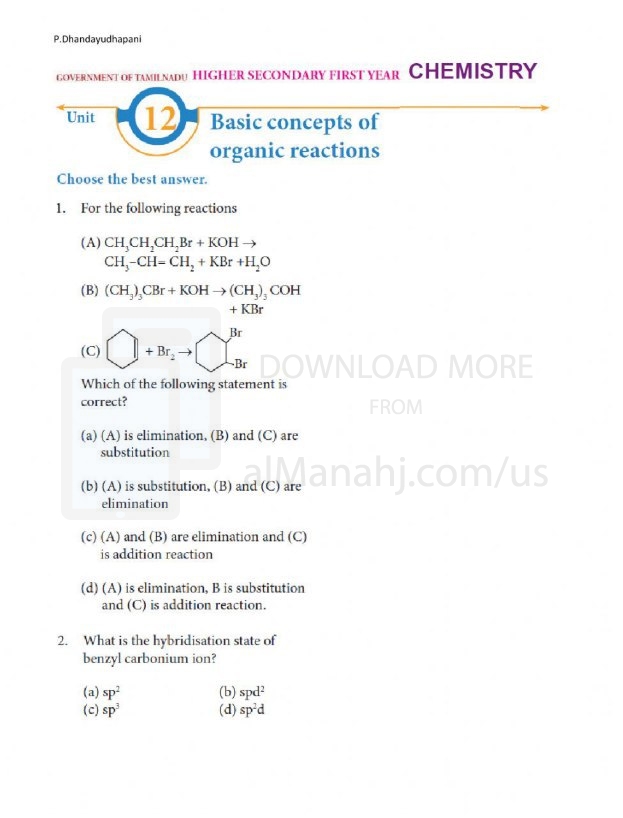| You are here: Almanahj Website ⇒ American curriculum ⇒ 9th Grade ⇒ Chemistry ⇒ Term 1 | ||
|---|---|---|
Worksheet about fundamentals of organic reactions | ||
|---|---|---|
| Subject: Chemistry | ||
| 9th Grade | ||
| Term 1 | ||
| Year: 2023/2024 | ||
| Size: 366KB | ||
| Number of clicks: 85 | ||
| Publish date:November 05, 2023 | ||
| Added by: Eman | ||
| Last download date: 2024-08-30 21:55:00 | ||
| Updated by: Eman9966 on 2023-11-05 06:12:01 | By: theodor P.Dhandayudhapani | |
File info: The fundamentals of organic reactions in chemistry involve understanding the principles and mechanisms underlying the transformations of organic compounds. Organic reactions are central to organic chemistry as they govern the synthesis, modification, and interconversion of organic molecules. Here's a description of the key aspects:1. Reactivity and Functional Groups: - Organic reactions primarily occur due to the reactivity of functional groups present in organic compounds. - Functional groups are specific arrangements of atoms that confer characteristic chemical properties and reactivity to organic molecules. - Different functional groups exhibit varying levels of reactivity, which determines the types of reactions they participate in. 2. Bond Breaking and Bond Formation: - Organic reactions involve the breaking of certain bonds and the formation of new bonds. - The breaking of bonds requires an input of energy (endothermic process), while the formation of new bonds releases energy (exothermic process). - The breaking and forming of bonds occur through the movement and rearrangement of electrons. 3. Reaction Mechanisms: - Reaction mechanisms describe the step-by-step pathway by which a reaction proceeds. - Mechanisms involve the movement of electrons, including the formation and breaking of chemical bonds. - Reaction mechanisms are typically represented using curved arrow notation to depict the flow of electrons. 4. Types of Organic Reactions: - Organic reactions can be broadly classified into several categories, such as substitution, addition, elimination, oxidation, and reduction reactions. - Substitution reactions involve the replacement of one functional group with another. - Addition reactions occur when two or more reactants combine to form a single product. - Elimination reactions involve the removal of atoms or groups from a molecule to form a double bond or ring structure. - Oxidation and reduction reactions involve the transfer of electrons, resulting in the increase or decrease of the oxidation state of atoms. 5. Reaction Conditions and Catalysts: - Organic reactions often require specific conditions such as temperature, pressure, solvent, or catalysts to proceed efficiently. - Catalysts are substances that facilitate the reaction by lowering the activation energy, increasing reaction rates, or providing an alternative reaction pathway. Understanding the fundamentals of organic reactions is crucial for organic chemists to design and control chemical transformations, predict the products of reactions, and develop new synthetic methodologies. Additionally, knowledge of organic reactions aids in the understanding of the behavior and reactivity of organic compounds in various chemical and biological processes. | ||
| Downloading link Worksheet about fundamentals of organic reactions |
|---|
|
1699164574.pdf
The file is being prepared for download
|
| File images |
|---|
 |